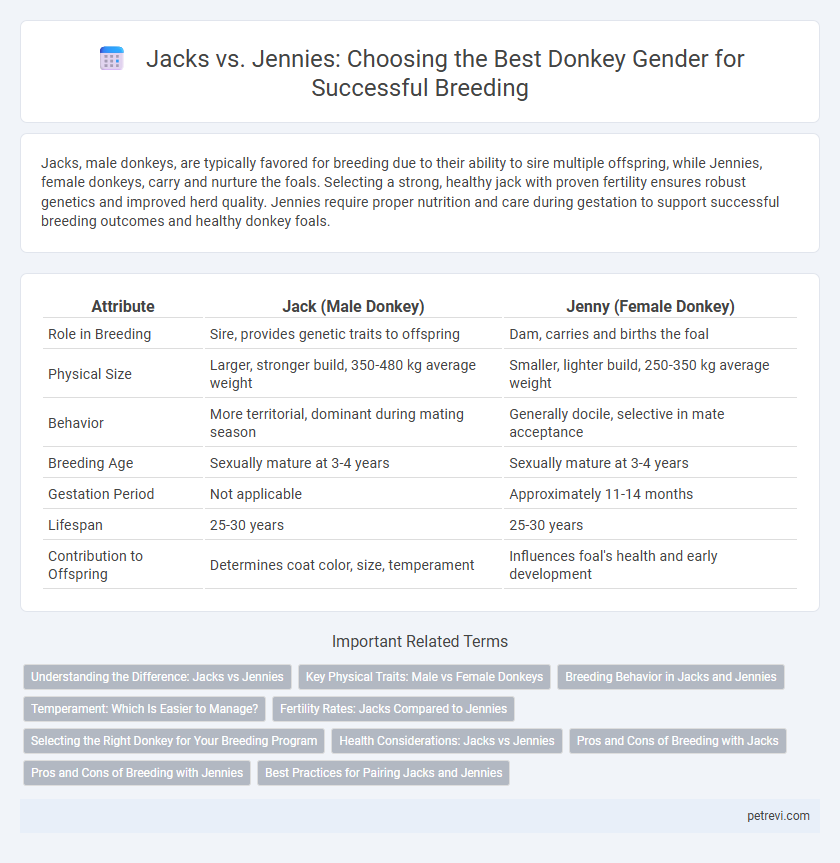Jacks, male donkeys, are typically favored for breeding due to their ability to sire multiple offspring, while Jennies, female donkeys, carry and nurture the foals. Selecting a strong, healthy jack with proven fertility ensures robust genetics and improved herd quality. Jennies require proper nutrition and care during gestation to support successful breeding outcomes and healthy donkey foals.
Table of Comparison
| Attribute | Jack (Male Donkey) | Jenny (Female Donkey) |
|---|---|---|
| Role in Breeding | Sire, provides genetic traits to offspring | Dam, carries and births the foal |
| Physical Size | Larger, stronger build, 350-480 kg average weight | Smaller, lighter build, 250-350 kg average weight |
| Behavior | More territorial, dominant during mating season | Generally docile, selective in mate acceptance |
| Breeding Age | Sexually mature at 3-4 years | Sexually mature at 3-4 years |
| Gestation Period | Not applicable | Approximately 11-14 months |
| Lifespan | 25-30 years | 25-30 years |
| Contribution to Offspring | Determines coat color, size, temperament | Influences foal's health and early development |
Understanding the Difference: Jacks vs Jennies
Jacks are male donkeys characterized by their larger size, stronger build, and role as breeders, producing offspring when paired with female donkeys or horses. Jennies, the female counterpart, are generally smaller and known for their maternal instincts, nurturing foals and contributing to population growth. Understanding the biological and behavioral differences between jacks and jennies is crucial for effective donkey breeding management and optimizing reproductive success.
Key Physical Traits: Male vs Female Donkeys
Male donkeys, or jacks, typically exhibit larger body size, more muscular build, and thicker necks compared to female donkeys, known as jennies. Jacks possess more prominent jawlines and a coarser coat, which aids in protection during mating season. Jennies generally have a softer demeanor, finer bone structure, and are slightly smaller, traits that influence their breeding efficiency and maternal instincts.
Breeding Behavior in Jacks and Jennies
Jacks exhibit dominant and territorial breeding behavior, often engaging in vocalizations and physical displays to attract Jennies and ward off rivals. Jennies show selective mating behavior, signaling estrus through specific vocal calls and postures that facilitate successful copulation. Both genders contribute unique behavioral cues that optimize reproductive success in donkey breeding.
Temperament: Which Is Easier to Manage?
Jacks in donkey breeding tend to exhibit more territorial and assertive behavior, often requiring experienced handlers to manage their dominant temperament effectively. Jennies usually display a calmer and more sociable demeanor, making them easier to handle for breeders prioritizing manageable temperaments. Considering temperament, jennies are generally preferred for breeding programs seeking straightforward management.
Fertility Rates: Jacks Compared to Jennies
Jacks generally exhibit higher fertility rates compared to jennies, with a successful breeding rate of approximately 75% to 90% per cycle, whereas jennies show fertility rates around 60% to 80%. The reproductive efficiency of jacks is influenced by factors such as age, health, and semen quality, which directly impact successful conception rates. Jennies require optimal nutritional and environmental conditions to maintain consistent estrous cycles and maximize their fertility potential in breeding programs.
Selecting the Right Donkey for Your Breeding Program
Selecting the right donkey for your breeding program involves understanding the differences between jacks (male donkeys) and jennies (female donkeys), as each plays a critical role in successful reproduction and offspring quality. Jacks are typically evaluated for their reproductive health, vigor, and genetic traits, while jennies are assessed for fertility, maternal instincts, and physical condition to ensure strong, healthy foals. Prioritizing thorough health screenings, pedigree analysis, and compatibility between jack and jenny will maximize breeding outcomes and improve the genetic pool of your donkey herd.
Health Considerations: Jacks vs Jennies
Jacks exhibit higher testosterone levels, which can influence aggression and require careful management to prevent injury during breeding. Jennies generally have greater maternal instincts and stronger immune systems, contributing to healthier offspring and smoother pregnancies. Monitoring reproductive health in both jacks and jennies is essential to minimize complications like infections or reproductive disorders that impact donkey breeding success.
Pros and Cons of Breeding with Jacks
Breeding with jacks offers the advantage of genetic diversity and strong offspring in donkey breeding due to their typical robustness and size. However, jacks can pose challenges such as aggressive behavior and a higher risk of injury to jennies during mating. Managing jacks requires skillful handling to ensure safety and reproductive success while optimizing the health and qualities of the progeny.
Pros and Cons of Breeding with Jennies
Breeding with jennies offers the advantage of predictable maternal behavior and care, which increases the survival rate of foals. Jennies typically have stronger bonds with their offspring and provide reliable nutrition through nursing, essential for healthy development. However, jennies can experience complications such as dystocia and postpartum infections, requiring careful management during breeding and foaling seasons.
Best Practices for Pairing Jacks and Jennies
Selecting healthy and genetically diverse jacks and jennies is crucial for successful donkey breeding, emphasizing compatibility in size and temperament to ensure effective mating. Optimal pairing practices involve monitoring breeding cycles carefully and providing stress-free environments to enhance fertility and pregnancy rates. Regular health checks and balanced nutrition for both jacks and jennies support strong offspring and reduce the risk of genetic defects.
Jacks vs Jennies for Donkey Breeding Infographic

 petrevi.com
petrevi.com